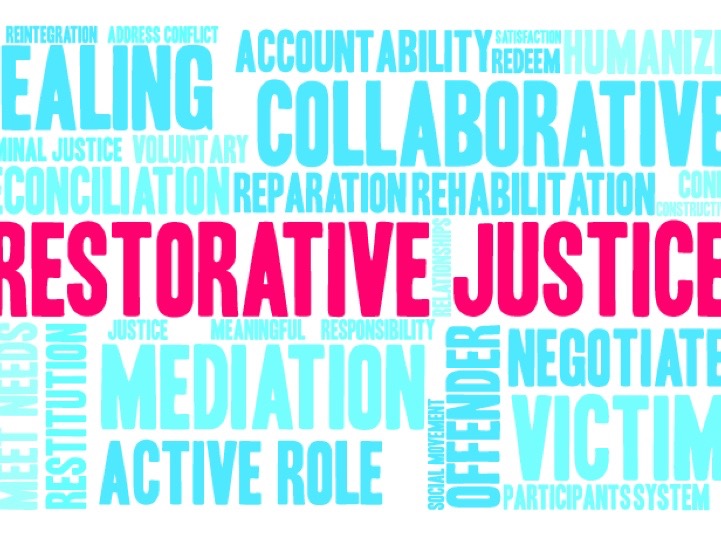Amherst Included In Expansion Of Restorative Justice in Hampshire County

Photo: NASPA.org
Source: amherstma.gov
District Attorney David E. Sullivan and six police chiefs have partnered with community stakeholders and local volunteers to increase access to restorative justice in Hampshire County. Based on their shared vision that restorative justice must be available broadly within Hampshire County, they announced the launch of Communities for Restorative Justice (C4RJ) in Hampshire County, a program that diverts adults out of the criminal justice system and into restorative justice programs.
“Restorative justice provides an alternative to the criminal justice process that meaningfully addresses structural inequities by enabling the community to take part in its own restoration after a crime has been committed. We have used restorative practices in our Juvenile Justice Unit for years and have worked with schools to integrate restorative justice into their disciplinary models,” said District Attorney Sullivan. “I am now incredibly pleased that restorative justice will be available for adults as well.”
The participating police departments, each of which has committed to an annual payment that funds administrative costs, are Amherst, Easthampton, Hadley, Northampton, South Hadley, and Ware. Additionally, the Northwestern District Attorney’s Office will support C4RJ, which will enable Assistant District Attorneys to refer cases from any police department in Hampshire County.
Restorative justice is a process to involve, to the extent possible, those who have a stake in an offense that has been committed and collectively to identify and address harms, needs, and obligations in order to heal and restore the community. Often this work is done before criminal charges are filed and instead of proceeding with a court case. Restorative justice programs subscribe to these principles: crime is a violation of people and relationships; crime creates harms, needs, and obligations; and those most affected should be meaningfully included and empowered.
Although restorative justice has been available in Hampshire County on a limited basis, C4RJ’s structure brings a reliable and expanded restorative justice model to the area. Local volunteers will be trained in restorative practices and the C4RJ process throughout the fall and will begin receiving referrals from police departments in early 2021. A second round of volunteer training in 2021 will enable the Hampshire County program to expand the number of cases it takes.
District Attorney Sullivan said, “Our office, which currently runs two pre-arraignment diversion programs out of the district courts, welcomes C4RJ and the opportunity it provides to divert cases out of the criminal justice system and into a community space that can lead to real transformation for all involved, including the offender, the victim, and the police officer. I am proud to join with our local police chiefs who jumped at the opportunity to send cases directly into restorative justice before a charge is issued. We all understand that restorative practices have important and deep historical roots and must be an integral part of our future.”
“As police officers, we are aware that the court system may not enable an offender to truly understand the harm they caused. Conversely, the system may not allow the victim of a crime to feel fully understood. What C4RJ provides is accountability, inclusion, and making things as right as possible. By providing inclusion, C4RJ provides the opportunity for the responsible person to be held accountable and for the participating community representatives to collaborate on the appropriate outcome,” said Easthampton Police Chief Robert Alberti. Hadley Police Chief Mike Mason agreed, “We all have cases that we know would be better served by diversion into a restorative process that aims to repair harm rather than punish the offender.”
Northampton Police Chief Jody Kasper noted that communities are calling for change and that C4RJ will enable police departments to respond to that call meaningfully. “What I particularly appreciate about the C4RJ model is that it includes the community and the victim in the restorative process and in reaching an appropriate outcome,” she said. “The C4RJ circles bring together community members, offenders, victims if they choose, and police officers and put everyone on equal footing as they seek the same goal of harm repair and reduction. The process empowers victims by actively including their voices.”
Amherst Police Chief Scott Livingstone emphasized the importance of crime prevention. “So often, people commit a crime and end up on probation or in jail, only to come out unchanged and continue to commit crimes. Restorative justice can interrupt the cycle, helping the offender understand the harm they are causing and care about the community they are harming.”
“Our partnership with C4RJ enhances our role as a community police department,” said South Hadley Police Chief Jen Gundersen. “Restorative justice values empathy and community responsibility in a way that the court system does not always allow for.” As Ware Police Chief Shawn Crevier observed, “There are numerous reasons why people commit crimes. Restorative justice is an important addition to the options our community has to respond.”
“This expansion into Western Massachusetts demonstrates that C4RJ’s model is replicable across the Commonwealth when we have strong partners who are willing to invest in a new way of doing things.” said Margot Fleischman, C4RJ Board President. “We’re grateful for the leadership of District Attorney Sullivan and his staff, and for the police chiefs of these six towns. We’re excited to be working with them to transform their communities’ response to crime through the use of restorative practices.”
For more information, contact Mary Carey: Mary.Carey@state.ma.us / 413-588-4274 (cell)
